Borce Ristevski admits to killing wife Karen
By his own confession, Borce Ristevski is the killer and liar nearly everyone suspected he was. But despite the plea, he has not come clean.
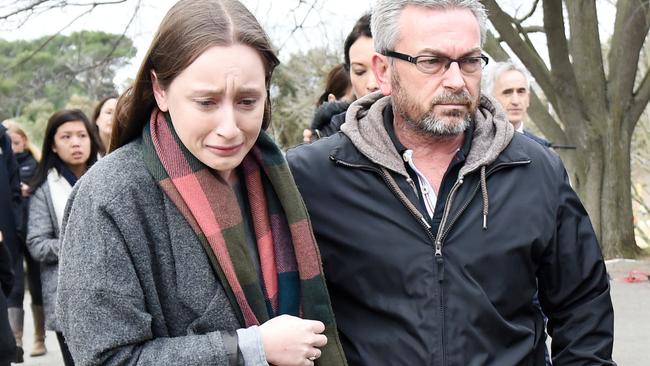
The question hung as cold as the winter air: “Borce, did you kill your wife?’’
Borce Ristevski glowered at the television reporter, then turned and walked silently away.
Nearly three years later, Ristevski was asked the same question again yesterday. This time, it was put with austere formality in the Victorian Supreme Court.
“Guilty,’’ he told the judge. By his own confession, he was the killer and liar nearly everyone suspected he was.
Yet, despite his change of plea, Ristevski has not come clean.
When offered an 11th-hour chance by the Victorian Office of Public Prosecutions to plead guilty to manslaughter instead of face trial for murder — to spend years more in jail but not the rest of his life — Ristevski abandoned his previous denials.
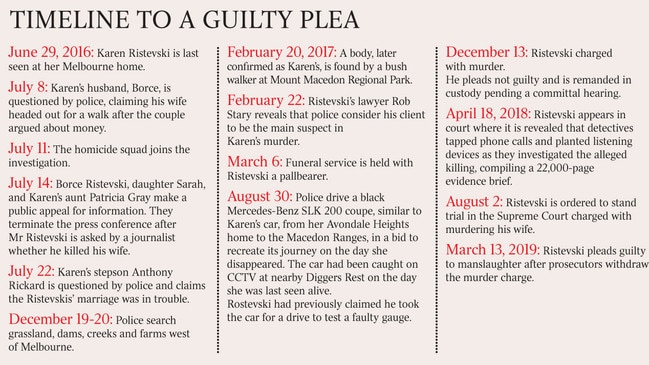
The deal comes with a cynical caveat. Ristevski has not told police what happened. He has not said how he killed Karen. He has not explained why. All he is prepared to say is he did it.
A grotesque charade that began on the morning of June 29, 2016, when Karen was last seen alive by daughter Sarah at their Avondale Heights home, northwest of Melbourne, will deliver justice of sorts but no resolution.
Ristevski will return to court on March 27 for a pre-sentence hearing. Unless he agrees to co-operate between now and then, many of the questions surrounding this morbid affair will remain unanswered.
The police case, built over the course of a painstaking investigation, was circumstantial and compelling. Ristevski was not caught out in one lie but in many, in his attempt to explain his movements after his wife disappeared.
At first, he adopted the role of worried husband, albeit unconvincingly, appealing to anyone who had seen Karen to come forward with information. At the time, she was listed as a missing person. It would take another eight months for a bushwalker to stumble across her decomposed body and confirm her family’s worst fears.
When interviewed by police, Ristevski told them he and Karen had argued about money and she had gone for a walk. He told police her final worlds to him were: “I’m going to go and clear my head.’’
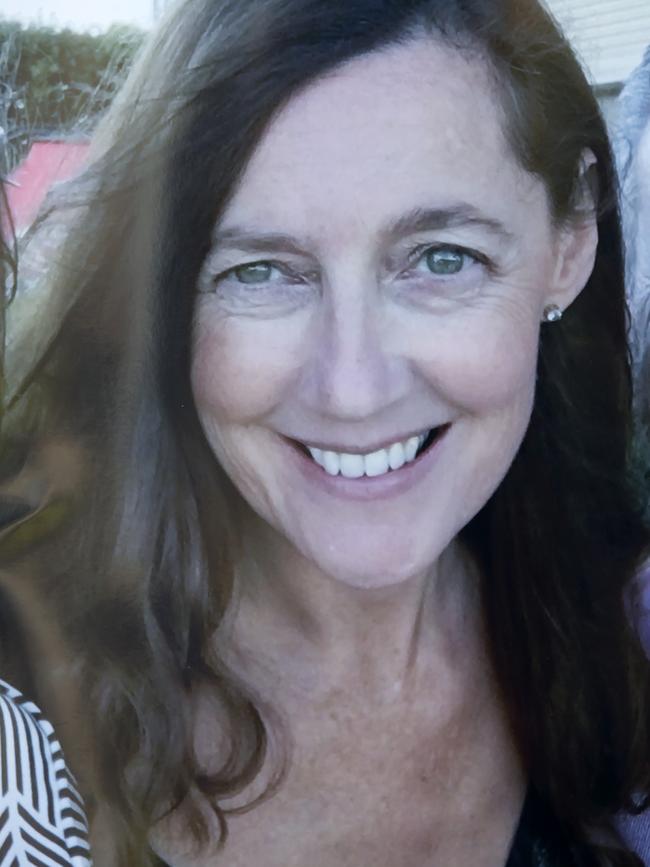
It wasn’t the first time it had happened, he told them, and she always came back. She was said to have left the family home on foot, wrapped in a black blazer and carrying a gold Coach handbag. Her shiny Mercedes coupe was left sitting in the drive.
Police were sceptical of his story. Phone records showed that on the day Karen went missing, her phone pinged a tower 40km northwest of Melbourne, where the outer suburbs give way to bushland. Borce’s phone had been switched off for part of the day.
CCTV footage from a camera at a level crossing not far from where Karen’s body was eventually found showed a black Mercedes coupe driving through on the day of the suspected murder. The image was not sharp enough to identify the car as Borce’s Mercedes — but it may have been.
When questioned about all this, Ristevski concocted a bizarre story. He told police he drove his missing wife’s car up the Calder Freeway, the main highway that runs northwest from Melbourne, on the day she vanished, claiming he was trying to test a faulty fuel gauge. He said the problem corrected itself when he hit a bump in the road. He then drove home.
Two weeks after Karen disappeared, her aunt Patricia Gray, daughter Sarah, and husband Borce stood on the banks of the Maribyrnong River, which runs behind the family home.
The previous day, police and SES volunteers had spent a long, hot afternoon picking through nearby bushland, hoping to find evidence that she was alive.
Police already suspected she was dead and Borce was the killer. Once the TV cameras started rolling, Ms Gray did the talking. She spoke of her family’s distress: “We take every day as it comes and every day it’s a nightmare.”
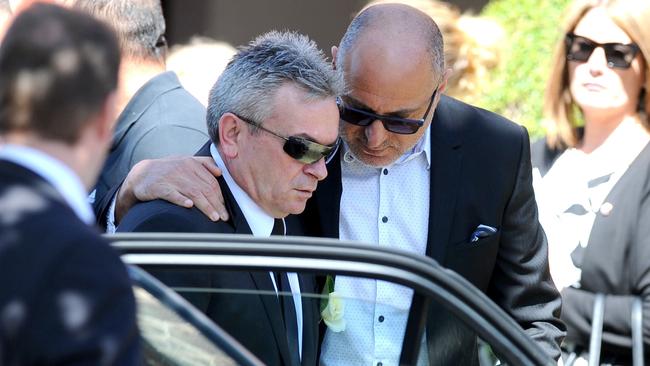
While she spoke, Borce stood next to his daughter, arms folded. He said nothing. As the news conference was wrapping up, Seven Network journalist Cameron Baud, an experienced crime reporter, turned to Borce and asked the question no one else had dared to ask. Homicide detectives watched the footage carefully and noted Ristevski’s reaction.
“At the time I was convinced it was a legitimate question that needed to be asked,’’ Baud said. “My thoughts are now very much with the family and what they have endured.’’
Vasko Ristevski backed up his brother Borce, declaring months after Karen disappeared that she was still alive. In August 2016, he pronounced that she had fled the country using a fake passport and was living overseas.
Any doubts were removed in February 2017 when the bushwalker found human remains wedged beneath a log in the Mount Macedon Ranges. The attempt to hide the body was haphazard. Dry leaves were all that concealed her bare feet.
An autopsy confirmed that the body was Karen’s but was unable to establish a cause of death. Police don’t know for certain where she was killed and when.
Her family is overwhelmingly relieved. Had this case gone to trial, it would have aired serious family conflict.
It would have examined the financial pressures on Karen’s fashion business and exhumed family tensions. It is bad enough that they look back on the day of Karen’s funeral and see the man who killed her helping to carry her casket.
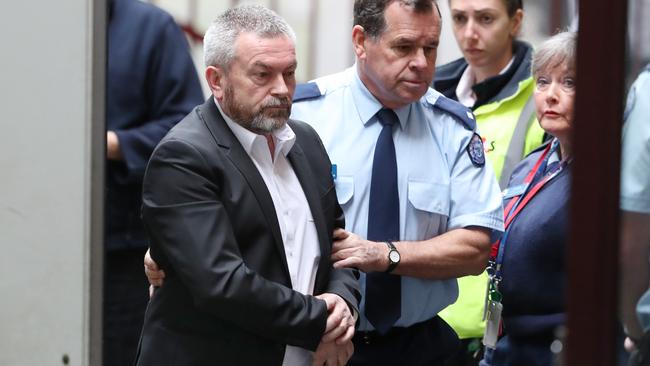
By the time of last year’s committal hearing, Sarah Ristevski had gone from supporting her father to taking the stand as a prosecution witness. Ms Gray, like police, has long been convinced that Borce was the killer.
The Cannavo family lived for many years in the same quiet street as the Ristevskis, and joined the search for Karen in those early days and weeks. They greeted yesterday’s change of plea with disbelief. “It just goes to show that anything can happen to anyone,’’ Emilla Cannavo said. “I feel really sad, especially for the daughter.’’
While most of Melbourne was at lunch yesterday, a plea agreement was struck. The reason for this had less to do with the strength of the prosecution case than a glaring weakness. Police were unable to establish a motive.
Although Borce and Karen regularly argued, their daughter told the court the arguments were never violent. Their financial pressures had not become more acute in the lead-up to Karen’s death. Ristevski did not stand to benefit financially from killing his wife.
In a pre-trial judgment, Supreme Court judge Christopher Beale ruled that the evidence showing what Ristevski did in the weeks after his wife went missing, his deceit and incongruous behaviour, could be used to demonstrate he killed her but not that he murdered her. “Whilst the post-offence conduct can be relied on as evidence that he killed his wife, it cannot be relied on to prove murderous intent,’’ the judge said.
Once confronted with this judgment, the state’s chief prosecutor, Brendan Kissane QC, asked for time to consider his position.
During a brief recess, the prosecutors and defence lawyers met and negotiated a deal. The murder charge would be withdrawn if Ristevski agreed to plead guilty to manslaughter.
His lies are at an end. The truth remains buried.
Additional reporting: Tessa Akerman


